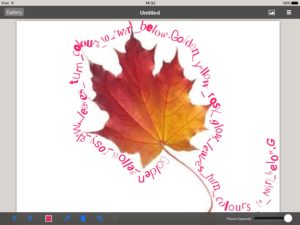
“To everything – turn, turn, turn, there is a season turn, turn, turn…” So sang The Byrds, in their 1965 version of Pete Seeger’s song. Which brings us to the turning of the season, when summer struggles to hold on before gracefully bowing down to the colours of Autumn’s majestic cloak.
Words can tickle the tongue, sound ‘funny’, stir the emotions, paint mental pictures, or break hearts. In that sense, like autumn, words are sensory. I am of the opinion that mixing sensory activities and words should be allowed to cross over from the Foundation stages and upwards as far as one dare to take them, because this can engage our sensory and kinaesthetic channels. The beginning of autumn heralds the start of a new school year. As well as new shoes, clothes and classrooms, for some, there is the trepidation of having to write. So I would like to offer some thoughts and ideas for supporting writing based on my favourite season.
Onomatopoeia and Haiku or Acrostic Poetry:
If possible and permissible, bring in leaves, twigs and other natural autumn items or materials that make similar sounds. Handling the materials, feeling the textures and listening to the sounds is a kinaesthetic and sensory way to kick-start vocabulary generation. Project images or video of autumn scenes and sounds to create an atmosphere to stimulate the imagination.
As pupils come up with words and phrases, each group, or as a whole class can create a word swap pool and a word bank using sticky notes or cut out leaves. Pupils can barter words, agree to share a word and contribute words to the word bank. Words in the bank could be ‘borrowed’ by anyone.
Give time to explore the sounds of words; which ones do pupils like best, which ones rhyme, sound ‘funny’, or are hard to spell? For older pupils, they could assign a points value to words with certain syllables, spelling difficulty or even how they sound. Have pupils work in pairs to make up lines and rhymes orally to hear the sound of the individual words and the combination of rhyme, rhythm and metre in the lines they invent.
Poetry is a form that is designed to be read aloud. Speaking out loud externalizes the mental writing process called subvocalisation, This is our mind’s inner voice ‘speaking’ as we construct sentences before writing them. External vocalisation engages the pupil’s auditory processing, helping to check how the sentence sounds, and whether it conveys the meaning we intend. It also helps to prime our planning process with a workable starting point.
At the writing stage:
Pupils could use pens to write certain words in autumn colours. For differentiation allow pupils to choose a syllable pattern for the lines from 1-3-1 up to 7-9-7 for Haiku, or a shorter or longer word for an Acrostic poem.
Autumn Haiku
Scrunch snap crunch
Leaves twigs and conkers
Under foot.
There are alternative ways to record our writing using dictation and apps. One App for iPad that has been out for about seven years is called TypeDrawing. Short sentences are typed in the text box, then you use your finger to draw around the shape of an image, as in this picture.
These ways of recording are sensory too, and because they take away the demand of putting pen to paper, pupils may be more open to respond positively.

Poetry forms like these can help writers of any age gain self-esteem and confidence because there is no ‘wrong’ result as long as the poetry form is adhered to.
This can help ease the inner fear and frustration of ‘failure’ the many struggling and unconfident writers, can face, because they know what they write will be scrutinized, judged and commented on. This places all of us who write in a position of vulnerability.
Young writers want to satisfy their audience (the teacher) among others so we need to be aware of our own biases we bring to another’s writing as we seek to provide constructive and encouraging feedback to our young writers.
Our young writers need celebrating for their word-filled creations!
Alastair Fielden is connect’s Education Consultant with over 20 years experience in SEND Education and assistive technologies.